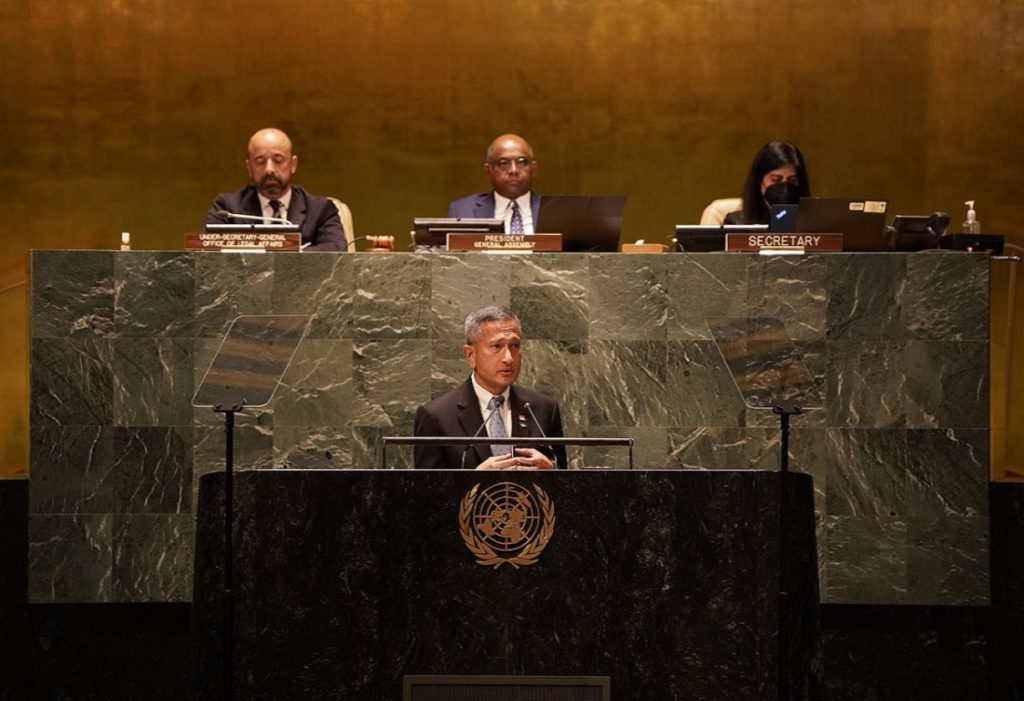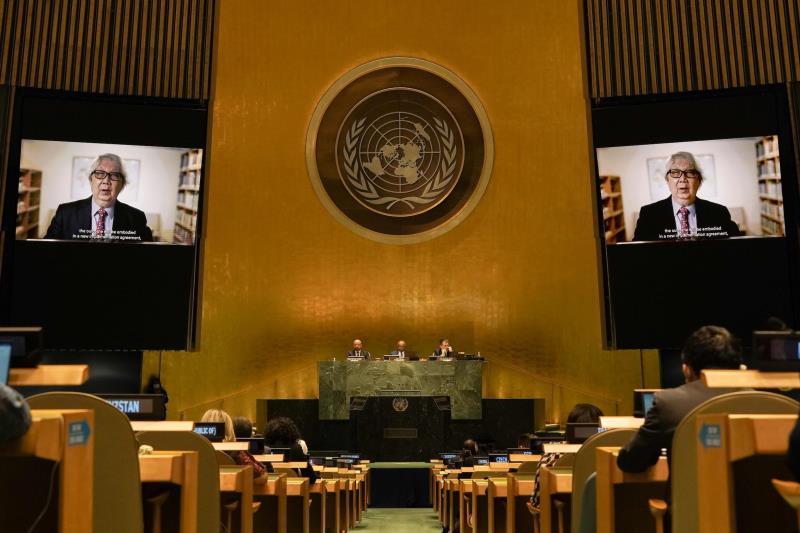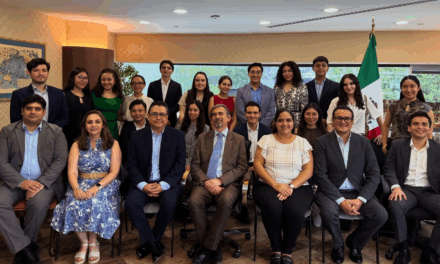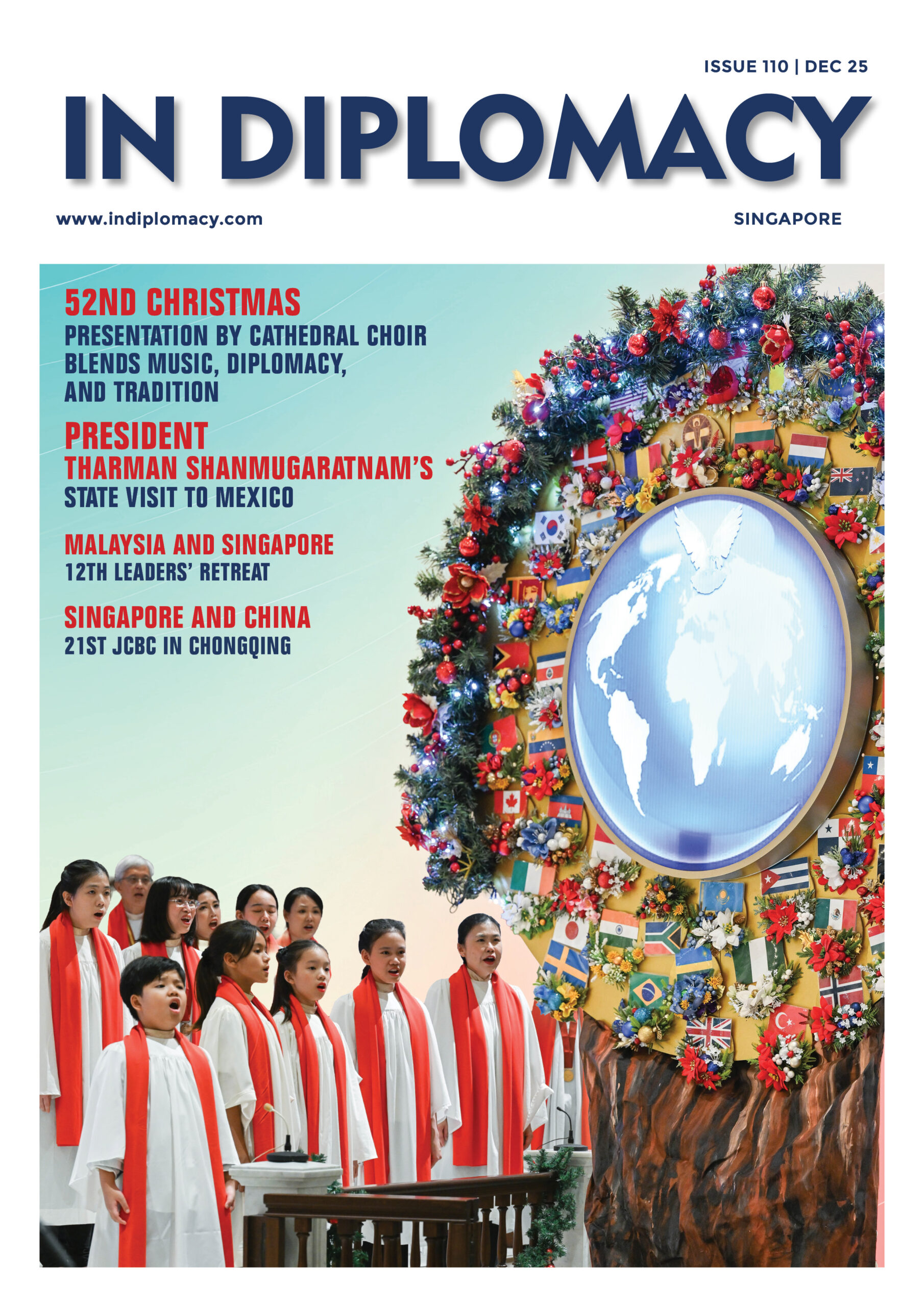
The anniversary of the UN Convention on the Law of the Sea is especially crucial for small island states like Singapore and was pivotal for multilateralism and the rule of law in the governance of the sea
MINISTER for Foreign Affairs Dr Vivian Balakrishnan spoke at a high-level meeting of the United Nations General Assembly (UNGA) to commemorate the 40th anniversary of the adoption of UN Convention on the Law of the Sea (UNCLOS). This meeting was convened by the President of the 76th Session of the UNGA (PGA) His Excellency Abdulla Shahid.
The meeting underscored the critical importance of UNCLOS which provides a universal legal framework on the governance of the oceans. When UNCLOS was adopted forty years ago, the international community committed itself to the rule of law in the oceans. The institutions created by UNCLOS have adapted to new challenges and made critical contributions to global peace and security. UNCLOS has assumed greater relevance given challenges such as the exponential growth of maritime shipping and the impact of climate change on the oceans.
In his remarks, Minister Balakrishnan emphasised that UNCLOS is especially crucial for Singapore as a small island state whose history, people and economy are intricately intertwined with the seas. Singapore is proud to have contributed to the adoption of UNCLOS in 1982 as Ambassador-at-Large Tommy Koh served as President of the Third UN Conference on the Law of the Sea. At PGA Shahid’s invitation, Ambassador Koh delivered a keynote address on the significance of UNCLOS.
Following is the transcripts of Minister Balakrishnan’s joint statement and national statement, and Ambassador Koh’s keynote address are appended.
TRANSCRIPT OF STATEMENT BY MINISTER FOR FOREIGN AFFAIRS DR VIVIAN BALAKRISHNAN
ON BEHALF OF DENMARK, GRENADA, KENYA, PORTUGAL AND SINGAPORE, AT THE HIGH-LEVEL COMMEMORATIVE MEETING OF THE GENERAL ASSEMBLY TO MARK THE 40TH ANNIVERSARY OF THE ADOPTION OF THE UNITED NATIONS CONVENTION ON THE LAW OF THE SEA, 29 APRIL 2022
Mr President, Excellencies, friends and colleagues,
1. I have the honour of delivering this statement on behalf of Denmark, Grenada, Kenya, Portugal and Singapore. We are the delegations that requested the convening of this meeting to mark the 40th anniversary of the adoption of the United Nations Convention on the Law of the Sea – UNCLOS – the constitution for the oceans.
2. We thank the President of the General Assembly for agreeing to convene this meeting, which commemorates and recognises a pivotal moment for multilateralism and the rule of law in ocean governance. UNCLOS is one of the United Nations’s greatest contributions to the codification and the progressive development of international law. Its adoption by the Third UN (United Nations) Conference on the Law of the Sea affirmed the power of multilateralism in addressing complex issues of the global commons. It also constituted a significant step towards the establishment of a new legal order for the oceans, which was ultimately achieved with UNCLOS’s entry into force in 1994.
3. Our delegations would like to highlight three points on this auspicious occasion.
4. First, we remember, celebrate and honour those who contributed to the conclusion of UNCLOS. The present generation of diplomats and international lawyers should draw inspiration from the leading figures and key participants at the Third Conference. UNCLOS is the legacy of their hard work, their commitment to cooperation and consensus-building, and willingness to promote global interests alongside individual national interests.
5. Second, we reaffirm our commitment to UNCLOS as providing the legal framework within which all activities in the oceans and seas must be carried out. It provides a comprehensive set of rules for the establishment of maritime entitlements and the peaceful settlement of maritime disputes. It is fundamental for upholding the right of all States to freedom of navigation and overflight, to maintaining open trade routes, sea lines of communication and the conservation and sustainable use of the oceans and their resources. We call on all States to fully and effectively implement our obligations under UNCLOS, bearing in mind that it was adopted as a package and (that) there should therefore be no selectivity in its application. We also call on non-Party States to become parties to UNCLOS.
6. Third, urgent multilateral action within the framework provided by UNCLOS is needed to ensure the health of our oceans. The implementation of SDG (Sustainable Development Goal) 14, underpinned by UNCLOS, is crucial in this regard. We look forward to the UN Ocean Conference, co-hosted by Kenya and Portugal in June and the fifth session of the BBNJ (Biodiversity Beyond National Jurisdiction) Intergovernmental Conference in August. We urge the international community to seize the opportunities presented by these and other multilateral meetings this year to take concrete steps in support of the conservation and the sustainability of our oceans.
7. UNCLOS has stood the test of time. For decades, it has contributed to global peace, security and economic development. Its rules, whilst firm, have sufficient flexibility and scope for new and emerging issues and challenges relating to the oceans to be addressed. Our delegations are confident that the importance of UNCLOS and its contributions will only continue to increase in the decades to come.
TRANSCRIPT OF NATIONAL STATEMENT BY MINISTER FOR FOREIGN AFFAIRS DR VIVIAN BALAKRISHNAN AT THE HIGH-LEVEL COMMEMORATIVE MEETING OF THE GENERAL ASSEMBLY TO MARK THE 40TH ANNIVERSARY OF THE ADOPTION OF THE UNITED NATIONS CONVENTION ON THE LAW OF THE SEA, 29 APRIL 2022
1. Mr President, I will now take the opportunity to speak in Singapore’s national capacity.
2. Singapore is a tiny island-State whose history, people and economy are intricately intertwined with the seas. We are thus proud to have been able to contribute to the formation of UNCLOS (United Nations Convention on the Law of the Sea), most notably when Ambassador Tommy Koh served as President of the Third UN Conference on the Law of the Sea from 1981 until its conclusion.
3. UNCLOS was envisioned and developed at a time when many coastal States were making increasingly extensive claims to unilaterally expand their jurisdiction and their rights to exploit the ocean’s resources. UNCLOS brought order and predictability to the governance of our oceans. It has provided a universal legal framework in which all States can work together, be they coastal, landlocked, geographically disadvantaged, archipelagic, or island States like us. The institutions created by UNCLOS have adapted to new challenges and made critical contributions to the rule of law in the oceans.
4. UNCLOS must play an even more crucial role today. Maritime shipping has grown exponentially as our economies become increasingly inter-connected. Total seaborne trade has risen nearly threefold since 1981. UNCLOS is especially crucial for Singapore, given that our overall trade is more than three times our GDP, and much of our trade is carried over the seas. Nearly 40% of the world’s population now live within 100 kilometers of the coast. Climate change has also brought new issues to the fore, such as degradation of coastal and marine ecosystems, sea-level rise, and ocean acidification.
5. Singapore will continue to support multilateral efforts to address these issues. For example, in our capacity as President of the BBNJ Intergovernmental Conference. Despite being extremely biodiverse, only 1% of the high seas are currently regulated. The BBNJ treaty will significantly contribute to the conservation and the sustainable use of our global commons. We should conclude negotiations on an ambitious and future-proof treaty as soon as possible.
6. Singapore is also actively participating in the negotiations for a Code of Conduct in the South China Sea, or COC, for short. We are committed to negotiating an effective and substantive COC that is in accordance with international law, in particular UNCLOS, and that also safeguards the rights and interests of all parties in the South China Sea.
7. With the adoption of UNCLOS 40 years ago, the global community3 decisively committed itself to the rule of law in the oceans. Singapore urges all countries to reaffirm their commitment to UNCLOS. We also urge all remaining non-Party States to accede to and/or ratify UNCLOS as soon as possible. We look forward to the next 40 years, hopefully, of peace, justice and progress on the oceans and the seas under the ambit of UNCLOS.
8. Thank you all very much.
TRANSCRIPT OF KEYNOTE ADDRESS BY PRESIDENT OF THE THIRD UN CONFERENCE ON THE LAW OF THE SEA AMBASSADOR TOMMY KOH AT THE HIGH-LEVEL COMMEMORATIVE MEETING OF THE GENERAL ASSEMBLY TO MARK THE 40TH ANNIVERSARY OF THE ADOPTION OF THE UNITED NATIONS CONVENTION ON THE LAW OF THE SEA, 29 APRIL 2022

Mr President,
Mr Secretary-General,
Distinguished Delegates,
Colleagues from the Conference Secretariat,
Friends from the Neptune group of non-governmental organisations,
Ladies and Gentlemen,
We are meeting to commemorate the 40th anniversary of the adoption of the UN Convention on the Law of the Sea, which I will refer to as UNCLOS. We should treasure the convention for the following eight reasons.
1. UNCLOS had put a stop to a period of chaos and unilateralism in the law of the sea. This was the situation in the 1950s, 60s and 70s. In its place, we have a treaty which I have described as a “constitution for the world’s oceans”. UNCLOS is universally accepted as the foundation of the legal order governing the uses and resources of the oceans.
2. UNCLOS has given birth to three successful institutions: the International Tribunal for the Law of the Sea, the International Seabed Authority and the Commission on the Limits of the Continental Shelf. I am glad that the heads of the three institutions will be speaking to the Assembly. I am also pleased that the President of the International Court of Justice will be addressing the Assembly. I am happy to report that there is no conflict between the jurisprudence of the tribunal and that of the court on the law of the sea.
3, The convention imposes a clear obligation on all States to protect and preserve the marine environment. UNCLOS, I would argue, is one of our most robust environmental treaties. The convention treats the ocean space as an ecological whole and seeks to protect the oceans and the marine environment from all sources of marine pollution. I welcome the recent decision by the UN Environment Assembly to begin negotiating a new treaty on marine plastic pollution.
4. UNCLOS has contributed to keeping the peace at sea. Wars can occur when there are no laws or when the laws are not clear. Many of us would not remember that two European countries went to war over fishing rights in 1972 and 1973. The clear rules in the convention on the rights and obligations of coastal States and other States in the different maritime zones are critical in avoiding conflict.
5. The convention contains a system of compulsory dispute settlement. This is a unique and precious feature of the convention. It enhances the prospects that disputes between States, on the interpretation and application of the convention, will be settled peacefully. Since the convention came into force, States have made good use of the different tools provided by the convention, including arbitration, adjudication and the first successful case of compulsory conciliation.
6. The convention is a post-colonial treaty and the developing countries played a major role in the making of this treaty. The convention is also a revolutionary treaty and contains many new concepts of law. The convention reflects the interests of all countries, including those of the developing countries. I would point to the Exclusive Economic Zone and the Common Heritage of Mankind to support my thesis.
7. The convention is a living document and is able to respond to new developments and challenges. I refer to the 1995 Implementation Agreement on Highly Migratory and Straddling Fish Stocks as an example. That agreement fills a gap in the convention and contains new principles of sustainable fishery. If the current negotiations, on the conservation and sustainable use of (marine) biological diversity, in areas beyond national jurisdiction, are successfully concluded, the outcome will be embodied in a new Implementation Agreement, under the convention.
8. Climate change and sea level rise will impact many aspects of the law of the sea. Sea level rise poses an existential threat to many countries, especially the small island developing countries. The convention contains the legal tools for us to meet this monumental challenge, but States must act and act urgently. The Secretary-General has described the situation as a Code Red for humanity.
Mr President, I shall conclude. UNCLOS is a victory for the UN, a victory for international law and the rule of law and a victory for the peaceful settlement of disputes. This victory is especially precious in our difficult times. I am glad I was able to play a very small role in this story.
Thank you very much.















